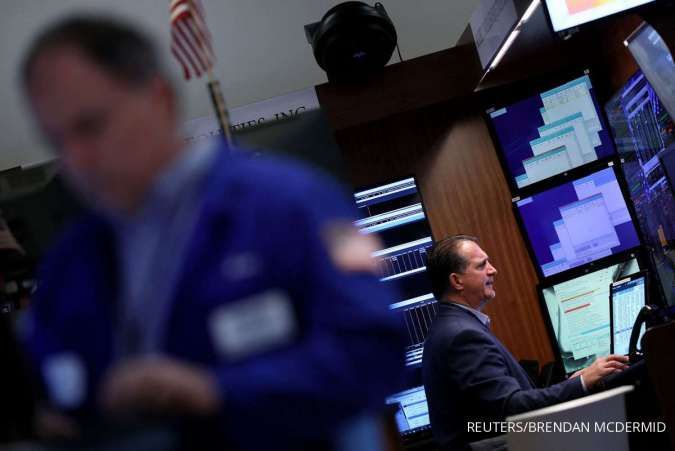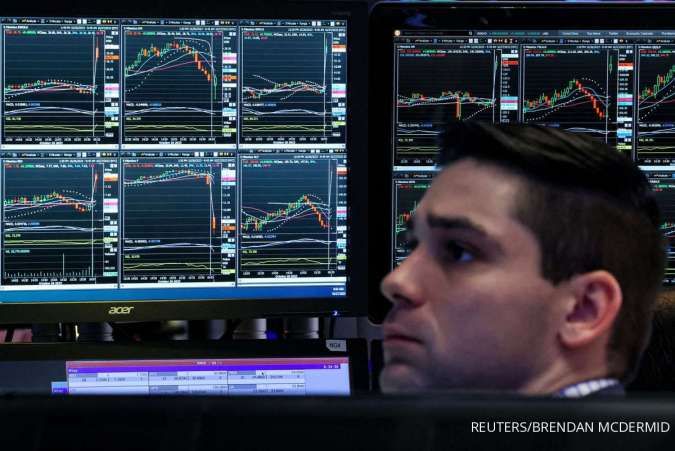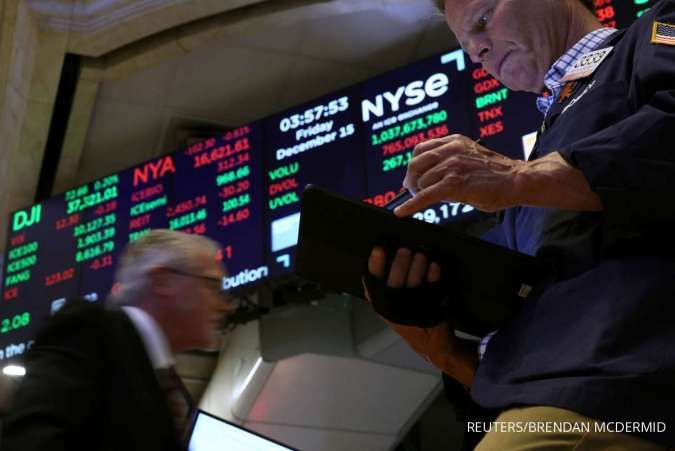KONTAN.CO.ID - LONDON/NEW YORK. Shares on Wall Street and in Europe fell on Monday and government bond yields surged off the back of geopolitical tensions, volatility in China and a scorching U.S. jobs report that dashed expectations of a near-term U.S. interest rate cut. The Dow Jones Industrial Average fell 1.07% to 38,239.86, the S&P 500 lost 0.73% to 4,922.23 and the Nasdaq Composite dropped 0.89% to 15,489.27 by 10:52 a.m. EST (1552 GMT) Two-year Treasury yields jumped to a one-month high of 4.483% after Federal Reserve chair Jerome Powell said in an interview aired on Sunday that he wanted to wait to be a little more confident that inflation was sustainably falling before moving interest rates lower.
MSCI's broadest index of world shares fell 0.76% while in Europe the broader STOXX 600 index gave back earlier gains to fall 0.15%.
Baca Juga: Samudra Indonesia (SMDR) Schedules to Add 12 Ships This Year "That we are past peak interest rates has generally been seen as a good thing and corporate earnings overall are hanging in there," said Russ Mould, investment director at AJ Bell, adding that the real struggle has been more in small cap stocks. Normally this would be a warning signal for an economic downturn, but Mould said this was maybe due to a more nuanced picture for these stocks with liquidity troubles, less sophisticated cash management functions, research availability and rates sensitivity. "It's definitely a trend to watch," he added. A higher number of companies had fourth quarter results which missed analyst expectations than historically, said a Goldman Sachs research note on Monday.
Baca Juga: Ramayana Lestari Sentosa (RALS) Preparing Capital Expenditure up to IDR 200 Billion Small cap stocks in Asia slumped as investor sentiment remained at rock-bottom on a lack of policy support and broad stimulus for China. The S&P China CSI 1000 small cap stock index fell more than 6%, closing at a three-year low. China's securities regulator vowed to prevent abnormal market fluctuations on Sunday, but announced no specific measures. China's blue-chip index closed up about 0.7% after dropping 2% earlier in the session and touching a five-year low last week. Hong Kong's Hang Seng Index finished down about 0.2%
Baca Juga: Becoming One of the Youngest CEOs of Unilever, This is the Figure of Benjie Yap State-backed investors - dubbed the "national team" - have stepped up buying blue-chip funds to support the market in recent weeks, but so far have failed to arrest a slump. FED FOCUS Global markets have been focused on the timing of the first Federal Reserve rate cut, after a strong slate of economic data along with resistance from central bankers has led investors to scale back their rate cut bets. Markets are currently pricing in an 80% chance of the Fed standing pat on rates in March, compared with a 33% chance at the start of the year, the CME FedWatch tool showed. Traders are pricing in just below 120 bps of cuts in total this year, compared with roughly 144 bps last week.
Baca Juga: Oil Steady as Rate Cut Caution Overshadows Mideast Strikes Data on Friday showed U.S. job growth accelerated in January and wages increased by the most in nearly two years, signs of persistent strength in the labour market that encourage the Fed to start easing later rather than sooner. "I think the Fed could be concerned with the link between sticky wages and future inflation prints," said Ben Bennett, APAC investment strategist for Legal and General Investment Management. "Underlying economic activity has also been robust, so I think the Fed could be back in wait-and-see mode." In an interview with CBS news show "60 Minutes" on Sunday, Powell said the U.S. central bank can be "prudent" in deciding when to cut rates, with a strong economy allowing central bankers time to build confidence that inflation will continue falling.
The dollar index, which measures the U.S. currency against six other majors, rose to twelve-week peak of 104.59
Baca Juga: Lautan Luas (LTLS) Allocates Capital Expenditure Up to IDR 300 Billion in 2024 Oil prices retreated after spiking on news of fresh U.S. strikes on Iran-aligned factions in Iraq, Syria and Yemen. Data indicating ample supply tempered fears about rising tensions. U.S. crude dropped 0.83% to $71.68 a barrel as Brent crude fell 0.57% to $76.89.






